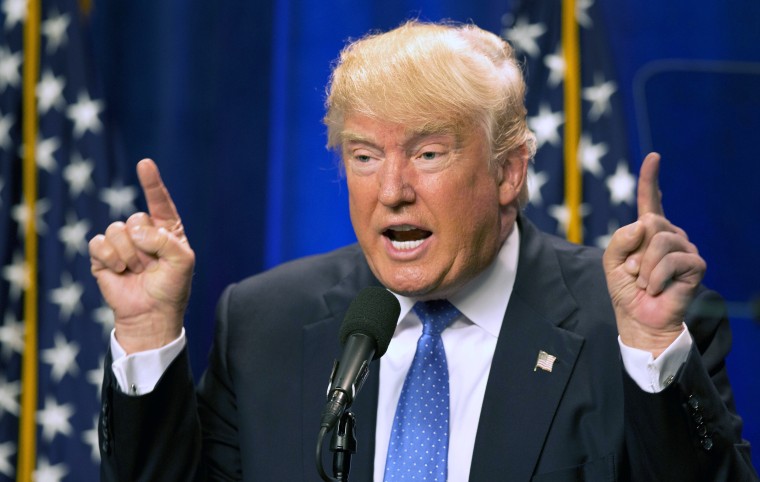For a brief moment on Monday at the start of his speech, Donald Trump was a different politician. Speaking in measured tones, he set aside the self-congratulations and bluster of his early response to the Orlando attack, offered his sympathy for the victims, acknowledged the LGBT community’s unique pain and led a moment of silence.
Then came his remarks. In a raging address, the presumptive Republican presidential nominee painted Muslim refugees, immigrants and even American citizens as a mortal danger; promised to block all Muslim travel to the United States; and warned of “big consequences” for Muslims who didn’t help turn in suspected terrorists.
“If we don’t get tough and if we don’t get smart and fast we're not going to have our country anymore,” Trump said. “There will be nothing – absolutely nothing – left.”
Trump’s speech, perhaps more than any moment in the campaign, marked a crossroads for the Republican Party. Has it become a far-right nationalist movement in the style of Europe’s hardline anti-immigration parties? Or will it resist Trump and eventually return to the center-right?
Related: How the Orlando nightclub shooting unfolded
At the core of Trump’s speech was his renewed call for a Muslim travel ban, which he said he would implement using executive authority as president until officials could “perfectly screen” against potential dangers.
“We cannot continue to allow thousands upon thousands of people to pour into our country, many of whom have the same thought process as this savage killer,” Trump said.
Trump’s proposal received almost universal condemnation from Democratic and GOP leaders alike when he first announced it after the San Bernardino attack in December.
The proposed ban, House Speaker Paul Ryan, who recently endorsed Trump, said at the time, “is not what this party stands for, and, more importantly, it’s not what this country stands for.”
Since effectively securing the party’s nomination, Republicans have expressed hope that Trump might change, both in policy and on tone. Trump seemed to backpedal slightly on the Muslim ban proposal last month, calling it merely a “suggestion.”
But on Monday, instead of backing down, Trump made it his top national security priority -- in effect daring his party to push back.
“I called for a ban after San Bernardino and was met with great scorn and anger, but now…many are saying that I was right to do so,” Trump said.
While Trump did acknowledge that the Orlando shooter was an American citizen born in New York 29 years ago, he said the shooter’s Afghanistan-born father proved the need for a halt on Muslim immigration.
“The bottom line is the only reason the killer was in America in the first place is because we allowed his family to come here,” he said.
Trump went on to use the same LGBT community he mourned at the start of his speech as a cudgel for a campaign swipe at Hillary Clinton.
"Hillary Clinton can never claim to be a friend of the gay community as long as she continues to support immigration policies that bring Islamic extremists to our country and suppress women, gays and everyone else who shares their beliefs or values," he said.
Exit polls during the primaries showed that Republican voters strongly supported Trump’s Muslim ban. The presumptive nominee seems willing to bet that he can force the GOP to back down rather than the other way around. If he succeeds, the party will never be the same.
In an ominous turn, Trump angrily cast the blame for the Orlando and San Bernardino attacks on Muslims living in America today. Without offering any evidence, Trump accused friends and neighbors of the attackers of having advanced knowledge of their deadly plots but choosing not to report them.
“They know what’s going on…They didn’t turn them in,” Trump said. “And you know what? We had death and destruction.”
Live updates: The latest on Orlando attack investigation
The accusation was of a piece with previous efforts by Trump to sow suspicion of ordinary Muslims in America, sometimes using false rumors and innuendo. After the Paris attacks, Trump falsely claimed that he had seen “thousands and thousands” of Muslims celebrate the 9/11 attacks in New Jersey.
It was also a striking contrast with President George W. Bush’s response to the 9/11 attacks. Bush visited a Muslim community center days after the attack and repeatedly urged Americans not to judge all adherents to the faith by terrorist groups like al Qaeda.
In an ironic twist, Clinton cited Bush’s response by name in her own speech on the Orlando attacks. Clinton, who called for renewed intelligence efforts and gun restrictions, never mentioned Trump.
Trump’s remarks came just hours after a series of interviews in which the candidate, who is known for spreading conspiracy theories, hinted that President Obama may have secret motives that prevent him from confronting Islamic terrorists.
His speech came days after a period of clashes with Republicans over his attacks on a federal judge, whom Trump said couldn’t fairly preside over a fraud lawsuit against Trump University due to his “Mexican heritage.”
Whatever hope Republicans had that Trump would unveil a new, different version of himself seven decades into his life, is now clearly extinguished. The election is hardening into a referendum on Trump, who has made it a referendum on whether Latinos and Muslims are full Americans. They will have to choose what that means for their present and their party’s future.

